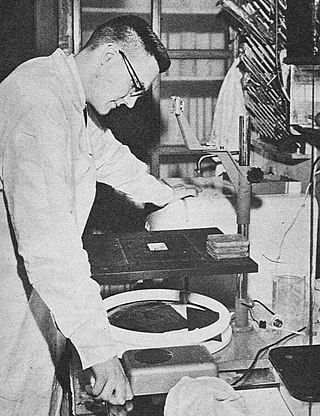Related Research Articles
Protease inhibitors (PIs) are medications that act by interfering with enzymes that cleave proteins. Some of the most well known are antiviral drugs widely used to treat HIV/AIDS, hepatitis C and COVID-19. These protease inhibitors prevent viral replication by selectively binding to viral proteases and blocking proteolytic cleavage of protein precursors that are necessary for the production of infectious viral particles.
The Institute of Cancer Research is a public research institute and a member institution of the University of London in London, United Kingdom, specialising in oncology. It was founded in 1909 as a research department of the Royal Marsden Hospital and joined the University of London in 2003. It has been responsible for a number of breakthrough discoveries, including that the basic cause of cancer is damage to DNA.

Glioblastoma, previously known as glioblastoma multiforme (GBM), is the most aggressive and most common type of cancer that originates in the brain, and has very poor prognosis for survival. Initial signs and symptoms of glioblastoma are nonspecific. They may include headaches, personality changes, nausea, and symptoms similar to those of a stroke. Symptoms often worsen rapidly and may progress to unconsciousness.

The deathstalker is a species of scorpion, a member of the family Buthidae. It is also known as the Palestine yellow scorpion, Omdurman scorpion, and Naqab desert scorpion, as well as by many other colloquial names, which generally originate from the commercial captive trade of the animal. To eliminate confusion, especially important with potentially dangerous species, the scientific name is normally used to refer to them. The name Leiurus quinquestriatus roughly translates into English as "five-striped smooth-tail". In 2014, the subspecies L. q. hebraeus was separated from it and elevated to its own species Leiurus hebraeus. Other species of the genus Leiurus are also often referred to as "deathstalkers". Leiurus quinquestriatus is yellow, and 30–77 millimetres (1.2–3.0 in) long, with an average of 58 mm (2.3 in).

Eisai Co., Ltd. is a Japanese pharmaceutical company headquartered in Tokyo, Japan. It has some 10,000 employees, among them about 1,500 in research. Eisai is listed on the Tokyo Stock Exchange and is a member of the Topix 100 and Nikkei 225 stock indices.

Targeted therapy or molecularly targeted therapy is one of the major modalities of medical treatment (pharmacotherapy) for cancer, others being hormonal therapy and cytotoxic chemotherapy. As a form of molecular medicine, targeted therapy blocks the growth of cancer cells by interfering with specific targeted molecules needed for carcinogenesis and tumor growth, rather than by simply interfering with all rapidly dividing cells. Because most agents for targeted therapy are biopharmaceuticals, the term biologic therapy is sometimes synonymous with targeted therapy when used in the context of cancer therapy. However, the modalities can be combined; antibody-drug conjugates combine biologic and cytotoxic mechanisms into one targeted therapy.
Miss Alabama USA, previously known as Miss Alabama Universe, is the beauty pageant that selects the representative for the state of Alabama in the Miss USA pageant, and the name of the title held by its winner. The pageant is directed by RPM Productions.

Sunitinib, sold under the brand name Sutent, is an anti-cancer medication. It is a small-molecule, multi-targeted receptor tyrosine kinase (RTK) inhibitor that was approved by the FDA for the treatment of renal cell carcinoma (RCC) and imatinib-resistant gastrointestinal stromal tumor (GIST) in January 2006. Sunitinib was the first cancer drug simultaneously approved for two different indications.
In medicine, a biomarker is a measurable indicator of the severity or presence of some disease state. It may be defined as a "cellular, biochemical or molecular alteration in cells, tissues or fluids that can be measured and evaluated to indicate normal biological processes, pathogenic processes, or pharmacological responses to a therapeutic intervention." More generally a biomarker is anything that can be used as an indicator of a particular disease state or some other physiological state of an organism. According to the WHO, the indicator may be chemical, physical, or biological in nature - and the measurement may be functional, physiological, biochemical, cellular, or molecular.

Chlorotoxin is a 36-amino acid peptide found in the venom of the deathstalker scorpion which blocks small-conductance chloride channels. The fact that chlorotoxin binds preferentially to glioma cells has allowed the development of methods for the treatment and diagnosis of several types of cancer.
The "war on cancer" is the effort to find a cure for cancer by increased research to improve the understanding of cancer biology and the development of more effective cancer treatments, such as targeted drug therapies. The aim of such efforts is to eradicate cancer as a major cause of death. The signing of the National Cancer Act of 1971 by United States president Richard Nixon is generally viewed as the beginning of this effort, though it was not described as a "war" in the legislation itself.

Erkki Ruoslahti is a cancer researcher and distinguished professor at Sanford Burnham Prebys Medical Discovery Institute. He moved from Finland to the United States in 1976.

TopoTarget was a Copenhagen-based biotechnology company focused on the discovery and development of drugs and therapies to treat cancer. In 2014, it merged with BioAlliance Pharma and is now part of Onxeo.

A brain metastasis is a cancer that has metastasized (spread) to the brain from another location in the body and is therefore considered a secondary brain tumor. The metastasis typically shares a cancer cell type with the original site of the cancer. Metastasis is the most common cause of brain cancer, as primary tumors that originate in the brain are less common. The most common sites of primary cancer which metastasize to the brain are lung, breast, colon, kidney, and skin cancer. Brain metastases can occur in patients months or even years after their original cancer is treated. Brain metastases have a poor prognosis for cure, but modern treatments are allowing patients to live months and sometimes years after the diagnosis.

Temozolomide, sold under the brand name Temodar among others, is an anticancer medication used to treat brain tumors such as glioblastoma and anaplastic astrocytoma. It is taken by mouth or via intravenous infusion.
The Alvin J. Siteman Cancer Center at Barnes-Jewish Hospital and Washington University School of Medicine is a cancer treatment, research and education institution with six locations in the St. Louis area. Siteman is the only cancer center in Missouri and within 240 miles of St. Louis to be designated a Comprehensive Cancer Center by the National Cancer Institute (NCI). Siteman is also the only area member of the National Comprehensive Cancer Network, a nonprofit alliance of 32 cancer centers dedicated to improving the quality and effectiveness of cancer care.
Professor Minesh P. Mehta, MD, FASTRO, is an American radiation oncologist and physician-scientist of Indian origin, Ugandan birth, Zambian Schooling and American Training, who contributed to the field of oncology for more than two and half decades.
Patient derived xenografts (PDX) are models of cancer where the tissue or cells from a patient's tumor are implanted into an immunodeficient or humanized mouse. It is a form of xenotransplantation. PDX models are used to create an environment that allows for the continued growth of cancer after its removal from a patient. In this way, tumor growth can be monitored in the laboratory, including in response to potential therapeutic options. Cohorts of PDX models can be used to determine the therapeutic efficiency of a therapy against particular types of cancer, or a PDX model from a specific patient can be tested against a range of therapies in a 'personalized oncology' approach.

Cancer Breakthroughs 2020, also known as Cancer Moonshot 2020 is a coalition with the goal of finding vaccine-based immunotherapies against cancer. By pooling the resources of multinational pharmaceutical, biotechnology companies, academic centers and oncologists, it intends to create access to over 60 novel and approved agents under exploration in the war against cancer and is expected to enable rapid testing of novel immunotherapy combination protocols. The initiative is being managed by a consortium of companies called The National Immunotherapy Coalition.
David Terry Curiel is an American cancer biologist. He is a professor of Radiation Oncology at Washington University School of Medicine and Director of the Biologic Therapeutics Center. In 1995, Curiel led a research team who were the first to develop a vaccine based on messenger RNA. Although they published proof of concept, he could not continue testing due to a lack of funding. In 2021, Curiel developed a vaccine that targets the SARS-CoV-2 virus through the nose.
References
- ↑ McIntosh, Charlotte (23 Oct 2000). "Hope for brain cancer cure". Birmingham Post-Herald. p. B1.
- ↑ Kowalczyk, Liz (30 Jan 1999). "Scorpion sting may be cure for brain cancer". The Anniston Star. Anniston, Alabama. p. 4B.
- ↑ Centers, Jessica (15 Mar 2004). "Technology incubator". The Anniston Star. Anniston, Alabama. p. 1B.
- ↑ Keeney, Jennifer; Kwon, Beth; Overfelt, Maggie (1 Feb 2003). "14 Hot Startups". CNN Money. Retrieved 21 December 2023.
- ↑ "Morphotek Acquires TransMolecular's Tumor-Targeting Drug Delivery Assets". Genetic Engineering & Biotechnology News. 5 April 2011. Retrieved 21 December 2023.